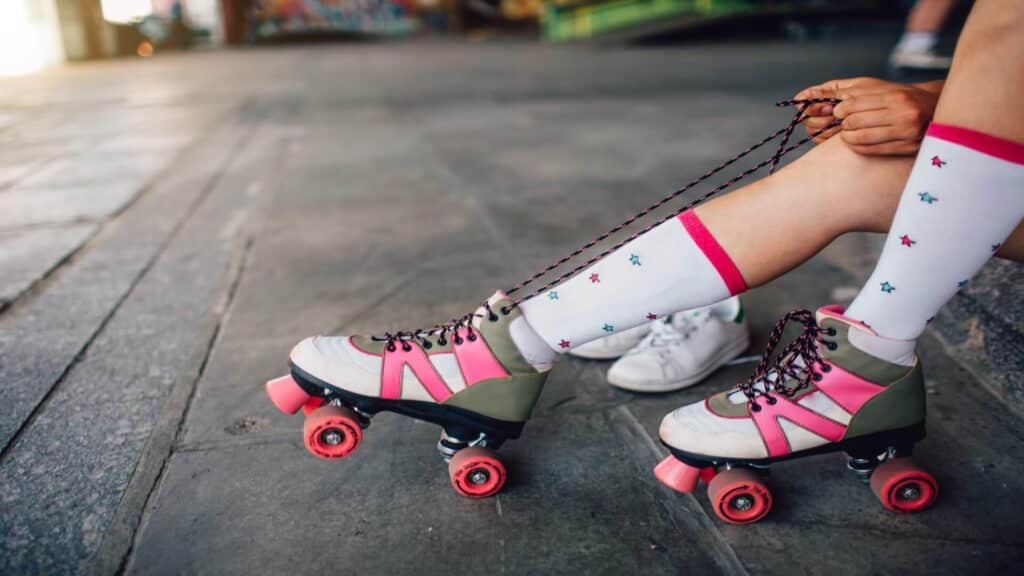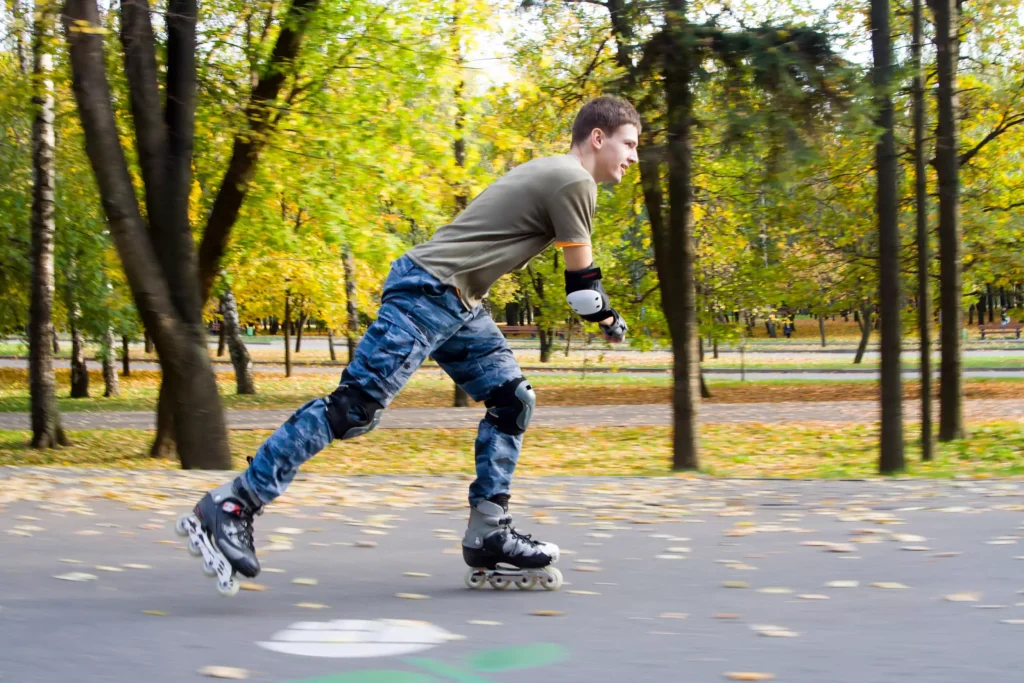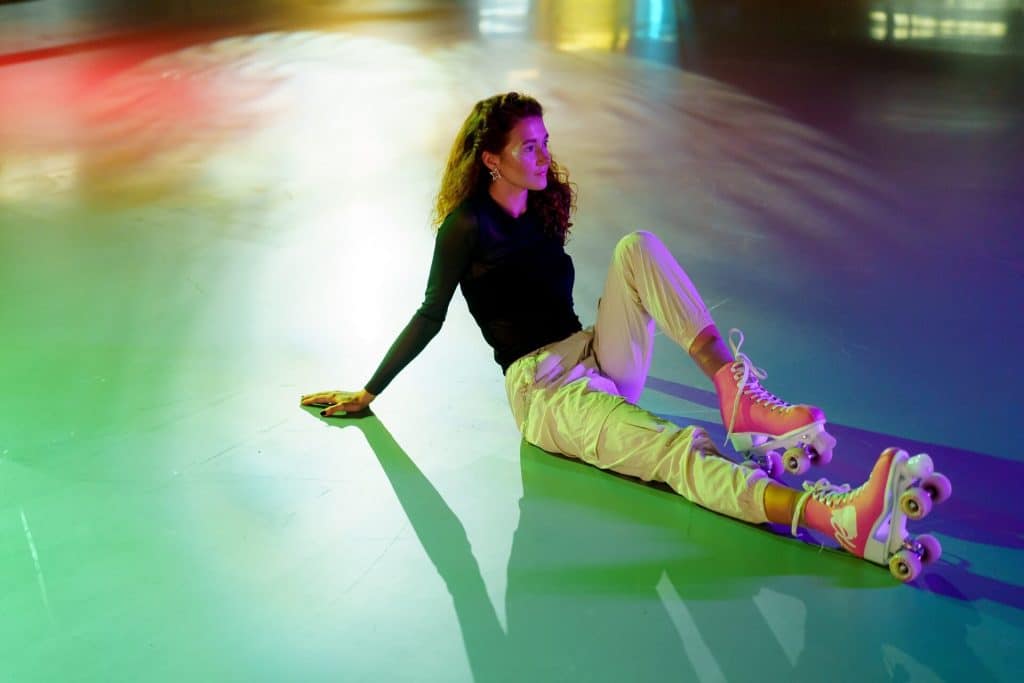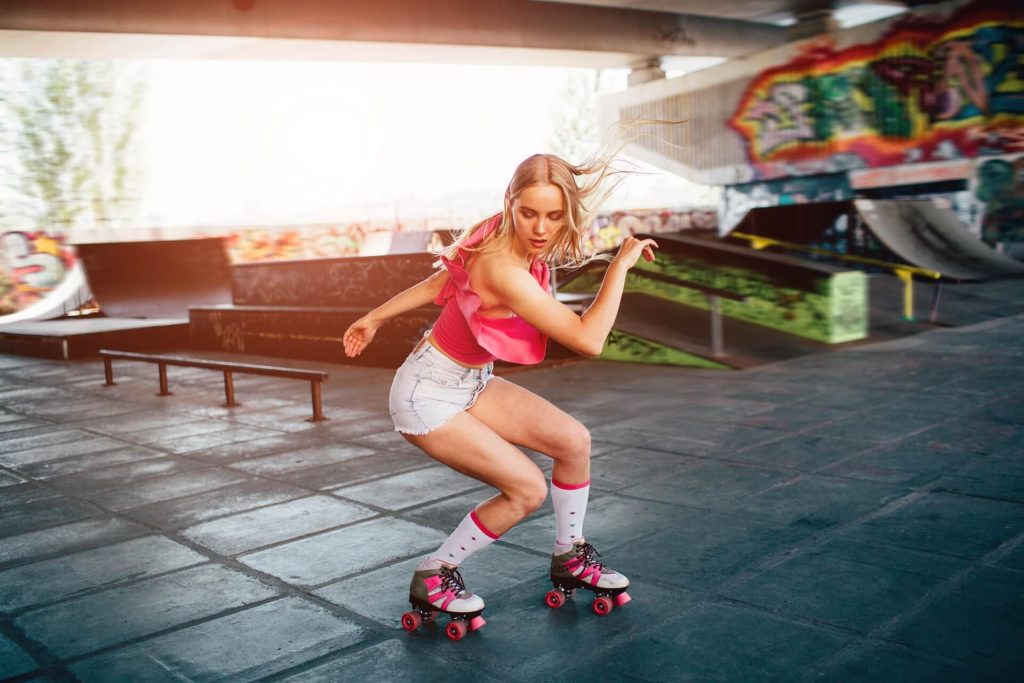Roller skating is a beloved activity that offers a thrilling and exciting way to get around while enjoying the great outdoors. However, there are several factors to consider when it comes to skating on concrete surfaces. In this article, we’ll explore the question: can you roller skate on concrete? and provide insights into the suitability, safety considerations, and techniques for skating on this surface.
Table of Contents
Suitability of Concrete Surfaces
Concrete surfaces can be suitable for roller skating, but it largely depends on their condition. Smooth and even concrete with minimal cracks or debris offers an ideal surface for skating. However, uneven or rough concrete can pose challenges and increase the risk of falls and injuries.
It’s essential to inspect the concrete surface before skating. Look for any cracks, potholes, or obstacles that could cause you to trip or lose control. Additionally, consider the slope and incline of the surface, as steep inclines may be more difficult to navigate and increase the risk of accidents.
Safety Considerations
Safety should be the top priority when roller skating on concrete. Proper protective gear, such as a helmet, knee pads, elbow pads, and wrist guards, is crucial to minimize the risk of injuries in case of falls.
Be aware of the hazards associated with skating on concrete. Falls can result in scrapes, cuts, and road rash, which can be painful and require medical attention. It’s also important to be mindful of your surroundings and watch out for obstacles, pedestrians, or vehicles that may cross your path.
Choosing the Right Skates
The type of skates you choose can significantly impact your experience when skating on concrete. Quad skates (with four wheels) and inline skates (with wheels in a straight line) are both viable options, but there are differences to consider.
When skating on regular concrete surfaces, it’s recommended to use skates with softer wheels. Harder wheels can struggle to grip the surface, making it difficult to maintain control and maneuverability. Wheels around 88A durometer (softness level) would be ideal for regular concrete.
However, if you’re skating on coated or smoother concrete surfaces, harder wheels around 98A can be a better choice, as they’ll provide a smoother roll and better speed.
Additionally, larger wheel sizes can help you navigate small cracks or debris more easily.
Another essential factor is the quality of the bearings in your skates. High-quality bearings will roll smoothly and reduce friction, allowing you to maintain speed and control on concrete surfaces.
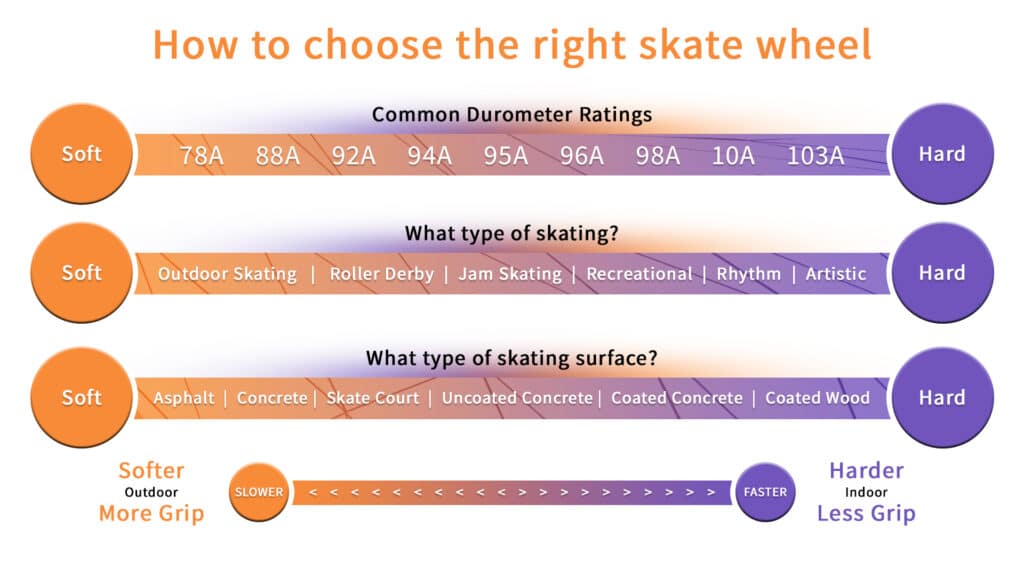
Asphalt vs. Concrete vs. Wood
While concrete is a common surface for roller skating, it’s not the only option available. It’s worth considering the differences between asphalt, concrete, and wood flooring when it comes to roller skating and choosing the appropriate wheel hardness.
Asphalt
Asphalt surfaces, such as those found in parking lots or some outdoor rinks, can be suitable for roller skating. For asphalt surfaces, we recommend using soft wheels around 78A durometer (softness level). The softer wheels will provide better grip and traction on the slightly rough and abrasive asphalt surface.
Concrete Flooring
As discussed earlier, concrete surfaces can be excellent for roller skating when they are smooth and well-maintained. For regular concrete surfaces, hard wheels around 88A to 92A are ideal, as they offer a good balance of grip and smoothness. However, for coated or smoother concrete surfaces, harder wheels around 98A can be a better choice, as they’ll provide a smoother roll and better speed.
Wood Flooring
Indoor roller rinks and skate parks often feature wood flooring specifically designed for roller skating. For coated wood flooring surfaces, we recommend using harder wheels around 103A durometer. The harder wheels will roll smoothly and maintain speed on the slick wood surface, while also providing sufficient grip for turning and stopping.
When choosing wheel hardness, consider the specific surface you’ll be skating on and your preferred skating style. Softer wheels generally provide better traction and grip, while harder wheels offer a smoother ride and higher speeds.
Remember, regardless of the surface or wheel hardness, always prioritize safety by wearing appropriate protective gear, practicing proper techniques, and being aware of your surroundings.
Techniques for Skating on Concrete
Proper stance and balance are crucial when roller skating on concrete. Keep your knees bent, your center of gravity low, and your weight evenly distributed. This will help you maintain control and stability, especially when navigating turns or avoiding obstacles.
Learning effective stopping and turning techniques is also essential. Practice various methods, such as the T-stop, plow stop, or heel brake, to ensure you can stop safely and change directions smoothly.
Be vigilant and constantly scan for obstacles or hazards on the concrete surface. Avoid areas with excessive cracks, debris, or uneven surfaces, as these can cause you to lose control or fall.
Finally, warm-up and cool-down exercises are recommended before and after skating sessions. Stretching and light exercises can help prepare your muscles and prevent injuries.
Roller Skating on Basketball Courts
Can you roller skate on a basketball court? Absolutely! Basketball courts can be excellent surfaces for roller skating. They are typically made of smooth, even concrete, providing an ideal skating environment.
One advantage of skating on basketball courts is the designated area, which can help minimize conflicts with other users. However, it’s still essential to be mindful of any basketball players or activities taking place on the court.
When skating on basketball courts, be cautious of the painted lines and markings, as they can create slippery or uneven surfaces. Additionally, avoid skating during peak hours or when the court is heavily occupied to ensure everyone’s safety.
Roller Skating on Tennis Courts
Can you roller skate on tennis courts? Tennis courts can also be suitable for roller skating, as they typically have smooth and well-maintained concrete surfaces. Similar to basketball courts, tennis courts offer designated areas for skating, reducing the risk of conflicts with other activities.
However, it’s crucial to be mindful of the painted lines and markings on tennis courts, as they can affect traction and maneuverability. Additionally, be respectful of any tennis players or activities taking place, and avoid skating during peak hours or tournaments.
When skating on tennis courts, it’s recommended to stick to the outer perimeter to minimize interference with ongoing matches or practices. Always be aware of your surroundings and be prepared to yield to tennis players or activities.
Conclusion
In conclusion, can you roller skate on concrete? Yes, roller skating on concrete is possible, but it requires caution, proper preparation, and the right techniques. By considering the suitability of the concrete surface, wearing protective gear, choosing the appropriate skates, and practicing safe techniques, you can enjoy a thrilling and enjoyable skating experience.
Additionally, roller skating on a basketball or tennis court can be an excellent option for roller skating, offering smooth and designated areas. However, it’s essential to respect other users, follow etiquette guidelines, and always prioritize safety.
Remember, roller skating is a fun and exciting activity, but it’s crucial to approach it responsibly and take the necessary precautions to ensure a safe and enjoyable experience for yourself and others.





